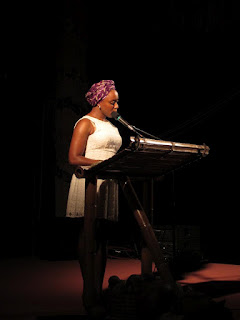Prairie Schooner and the African Poetry Book Fund are partnering with the Brunel University African Book Prize was which just announced. The announcement of this new prize follows:
The Brunel University African Poetry Prize is a major new poetry prize of £3000 aimed at the development, celebration and promotion of poetry from Africa. The prize is sponsored by Brunel University and partnered by Commonwealth Writers, the Africa Centre UK, and the African Poetry Book Fund USA.
British-Nigerian writer, Bernardine Evaristo, who has initiated the prize, describes her reasons for a new prize exclusively devoted to African poetry:
I have judged several prizes in the past few years, including chairing the Caine Prize for African Fiction in 2012, an award that has revitalised the fortunes of fiction from Africa since its inception in 1999. It became clear to me that poetry from the continent could also do with a prize to draw attention to it and to encourage a new generation of poets who might one day become an international presence. I am particularly interested in new voices who are exploring poetry that perhaps draws on the poets' own cultural aesthetics - doing something original, something different. African poets are rarely published in Britain. I hope this prize will introduce exciting new poets to Britain's poetry editors.
Prairie Schooner, one of the leading literary presses in the USA, having published continuously for eighty-five years, has committed to publishing some of the work of the winning poets of the Brunel University African Poetry Prize. Wasafiri, the leading British journal of international writing, will also publish the winner. Similar arrangements will be pursued with other major literary journals in the United Kingdom and the US.
Rules
- The prize will be for ten poems by an African writer who has not yet had a full-length poetry book published. (Self-published books, chapbooks and pamphlets are exempt.)
- The prize is open to poets who were born in Africa, or who are nationals of an African country, or whose parents are African.
- Only poetry written in English is eligible. Translated poetry is accepted but a percentage of the prize will be awarded to the translator.
- The prize opens for entries on October 26th 2012 and the winner will be announced in April 2013.
- There will be a distinguished panel of judges including the poet Kwame Dawes and the academic Mpalive Msiska. There will also be an advisory committee. All to be announced.
For more updates and additional information go to the Facebook page of the Prize or contact Bernardine Evaristo. Additional information about the Brunel University African Poetry Prize will be available at the website of the African Poetry Book Fund.






